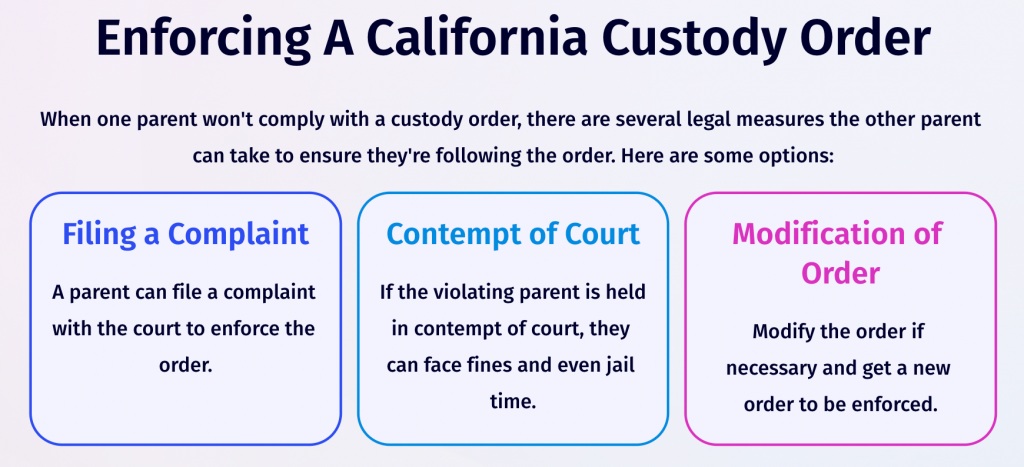Tips for Co-Parenting and Ensuring Order Compliance
Navigating the complexities of co-parenting and ensuring compliance with custody and visitation orders can be a challenging task for parents in California. However, there are practical strategies and tips that can help foster a cooperative co-parenting relationship while ensuring the smooth implementation of court-issued orders.
1. Effective Communication: Open and respectful communication between parents is vital for successful co-parenting. Establishing clear lines of communication, whether through email, text, or a co-parenting communication platform, allows for efficient coordination and reduces misunderstandings. Keeping conversations focused on the child’s well-being and avoiding personal conflicts can contribute to a more amicable co-parenting dynamic.
2. Written Agreements: Documenting custody and visitation agreements in writing provides clarity and serves as a point of reference for both parents. These written agreements can include details such as visitation schedules, holiday arrangements, and decision-making responsibilities. Having a written record helps ensure that both parties are aware of their obligations and can serve as evidence if disputes arise.
3. Flexibility and Cooperation: Flexibility is key in co-parenting, as unforeseen circumstances or changing needs may require adjustments to the custody and visitation arrangements. Being open to reasonable requests and demonstrating cooperation can go a long way in maintaining a positive co-parenting relationship. Both parents should strive to work together to find solutions that prioritize the child’s best interests.
4. Encourage a Positive Relationship: It is important to encourage and support the child’s relationship with the other parent. Avoid making negative comments or engaging in actions that may undermine the other parent’s authority or influence. Promoting a positive co-parenting relationship fosters stability and emotional well-being for the child.
5. Seek Support and Resources: Co-parenting can be emotionally challenging, and seeking support can be beneficial for both parents. Consider attending co-parenting classes, support groups, or engaging in individual counseling to navigate the emotional aspects of co-parenting effectively. These resources can provide valuable guidance and help parents develop coping strategies for any difficulties that may arise.
6. Document Non-Compliance: If one parent consistently violates custody and visitation orders, it is crucial to document these instances of non-compliance. Keep a record of missed visitations, denied access, or any interference encountered. This documentation serves as evidence if enforcement measures need to be pursued through legal channels.
By implementing these tips, parents can create a cooperative co-parenting environment that prioritizes the child’s well-being and ensures compliance with custody and visitation orders. Remember, effective co-parenting requires ongoing effort, flexibility, and a focus on fostering a healthy and stable environment for the child’s growth and development.






